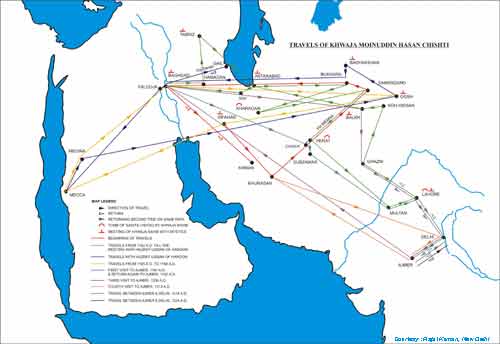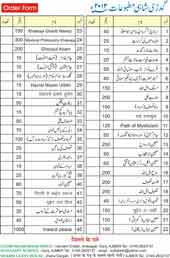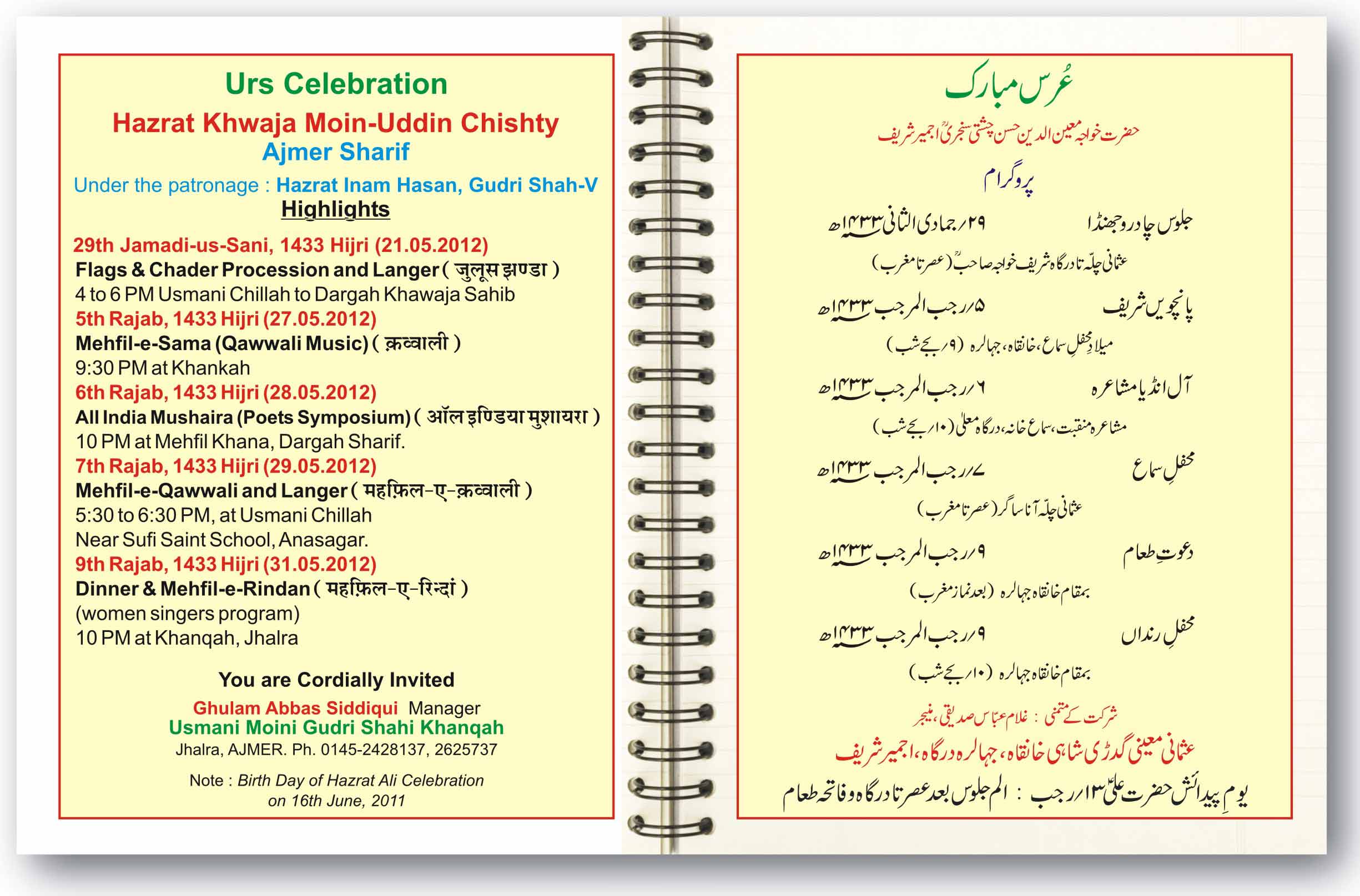|
Early Life
Khwaja Moinuddin Hasan Chishti was born in Asfahan and brought up in Sanjar, Persia, in the year 530 AH / 1135 AD. He was the son of Khwaja Ghiyas Uddin Hasan and Bibi Mah Nur. In 544 AH / 1150 AD, his father passed away leaving him a garden and a grinding stone as inheritance. Soon thereafter, Khwaja Sahib came in touch with a mystic, Hazrat Ibrahim Qandoozi. The meeting bought about a noticeable change in his condition and he became absorbed in the search for Truth. He sold his inheritance and left for Khorasan.
He traveled far and wide and during his search, he met Hazrat Sheikh Abdul Qadir of Jilan, better known as Ghous-ul-Azam, and also Hazrat Khwaja Usman Harooni. His search for a spiritual guide was rewarded when Hazrat Khwaja Usman Harooni took him as a mureed (spiritual disciple).
He spent several years under the guidance of Khwaja Usman Harooni and traveled widely with him, seeking Truth and meeting mystics and adding to his spiritual treasures. In the year 582 AH / 1186 AD, he was appointed spiritual successor by his spiritual guide, Hazrat Khwaja Usman Harooni. Later, upon his visit to Medina in 583 AH / 1187 AD, he received a mandate from the Holy Prophet to proceed to Ajmer.
Mandate from the Holy Prophet
Hazrat Khwaja Moin Uddin Hasan Chishti came to India as the harbinger of peace and humanism and as an ambassador of unity and goodwill. He ultimately came to be identified as the Spiritual Sovereign of India.
Hazrat Khwaja Moin Uddin Hasan Chishti received the mandate from the court of the Holy Prophet Mohammed to the effect that: -
"O, Moin Uddin! Thou art a helper of my religion. I entrust to thee the country of Hindustan (India) where prevails darkness. Proceed on to Ajmer, and spread there our gospel of Truth."
Receiving this mandate, Khwaja Sahib was immensely pleased but wondered, as to where Ajmer was situated. In the meantime, he felt drowsy. He fell asleep and was blessed by the vision of the Holy Prophet Mohammed in a dream, who showed him the city, the fort and the location of Ajmer. He was bid farewell, and was given a pomegranate from heaven.
Thus began his journey to Ajmer, India
Travels of khawaja moinuddin hasan chisthi

Chronology
530 AH / 1135 AD
Born in Asfahan, brought up in Sanjar.
He was the son of Khwaja Ghiyas Uddin Hasan and Bibi Mah Nur.
He had two brothers.
544 AH / 1150 AD
His father passes away.
A grinding stone and a garden form the part of his inheritance .
He meets a mystic by the name of Ibrahim Qandoozi who offers him a piece of oil cake, which brings about a noticeable change in his condition. He then sells his grinding stone and the garden.
Leaves in search of Truth.
Reaches Khorasan.
Stays in Samarqand and Bukhara for five years and receives education.
550 AH / 1155 AD
Leaves Samarqand and Bukhara.
551 AH / 1156 AD
Meets Hazrat Mohiuddin Abdul Qadir of Jilan better known as Ghous ul Azam.
Leaves Iraq for Arabia.
Returns from Arabia and undertakes a journey to Haroon.
There he spends two and a half years in the company of Khwaja Usman of Haroon.
555 AH / 1160 AD
Visits Baghdad where he meets Shaiklh Abu Najeeb Suhrawardy. Leaves Baghdad for Syria.
556 AH / 1161 AD
Visits Kirman.
557 AH / 1162 AD
Visit to Hamdan.
Visits Tabriz.
Astrabad visited.
Bukhara visited.
Visit to Kharqan.
Visit to Samarqand.
558 AH / 1163 AD
Visit to Memna.
560 AH / 1165 AD
Herat visited.
561 AH / 1165 AD
Arrives in India for the first time.
Visits Multan. Proceeds to Lahore where he spends two weeks at the tomb of Shaikh Ali Hujweri better known as Data Ganj Baksh.
Proceeds to Ghazni.
Reaches Balkh.
Proceeds to Astrabad.
Reaches Merv.
Returns to Baghdad and accompanies Khwaja Usman Harooni on travels.
562 AH / 1166 AD
Meets Shaikh Shahab Uddin Suhrawardy in Baghdad.
Leaves Baghdad for Mecca with his spiritual Khwaja Usman Harooni. Reaches Falooja and Mecca.
Honoured by the visit to Kaaba.
Reaches Medina where he offers himself at the court of the Holy Prophet Muhammad.
Reaches Oosh where he meets Shaikh Baha Uddin.
Badakshan visited. Reaches Bukhara.
573 AH / 1177 AD
The mother of Qutub Uddin Bakhtiar sends Qutub Uddin Bakhtiar Kaki to Khwaja Sahib for the ceremony of Bismillah, though Qazi Hamid Uddin of Nagore performs it. Reaches Sewistan where he meets Sadi Uddin Muhammad Ahmed.
581 AH / 1185 AD
Meets Shaikh Najra Uddin Kubra in Sanjar.
Meets Shaikh Abdul Qadir of Jilan a second time.
582 AH / 1186 AD
Receives the Holy Relics and is appointed spiritual successor by his spiritual guide, Hazrat Khwaja Usman Harooni.
583 AH / 1187 AD
Reaches Oosh and moves on to Asfahan.
Accepts Khawaja Qutub Uddin Bakhtia Kaki as his disciple.
Leaves Asfahan for Mecca to perform the pilgrimage.
After performing the pilgrimage, proceeds to Medina.
Receives a mandate from the Holy Prophet to proceed to Ajmer.
586 AH / 1190 AD
Upon reaching Baghdad from Medina, appoints Khawaja Qutub Uddin Kaki as his Caliph and Sajjadanashin.
Chisht reached. Proceeds to Subzawar.
Yadgar Muhammad becomes a disciple.
587 AH / 1191 AD
Reaches Lahore via Multan.
Proceeds to Delhi. Stays in Samana from where he proceeds to Ajmer.
Reaches Ajmer for the firt time.
Sadhu Ram and Ajai Pal enter his fold.
Muhammad Yadgar sent to select a place for residence.
Leaves Ajmer.
588 AH / 1191 AD
Ajmer revisited. Comes from Ghazni via Lahore and Delhi.
590 AH / 1194 AD
His first marriage takes place with Bibi Ummat Ullah.
Two sons are born out of this union, namely Khawaja Fakhr Uddin Abdul Khair and Khawaja Hisam Uddin. Also a daughter named Bibi Hafiz Jamal.
598 AH / 1200 AD
Leaves Ajmer for Baghdad.
Visits Balkh.
Maulana Zia Uddin becomes his follower.
602 AH / 1206 AD
Visits Ajmer for the third time.
Reaches from Balkh via Gjhazni, Lahore and Delhi.
610 AH / 1231 AD
Arrives in India for the fifth time and in Ajmer for the fourth time.
611 AH / 1214 AD
Arrives in Delhi during the reign of Sultan Ill-tut-Mish for the first time.
611 AH / 1215 AD
Confers a robe upon Baba Farid Uddin Gange-e-Shakar.
Khwaja Usman Harooni arrives in Delhi.
Writes a book entitled Kanjul Israr at the behest of his spiritual guide.
615 AH / 1219 AD
Returns from Delhi to Ajmer.
620 AH / 1223 AD
Marries a second time - Bibi Asmat Ullah.
Out of this union, Khawaja Zia Uddin Abu Saeed born.
621 AH / 1224 AD
Visits Delhi a second time during the reign of Sultan-ll-tut-mish to plead on behalf of a farmer.
Returns to Ajmer.
627 AH / 1229 AD
Bids Khawaja Qutub Uddin Bakhtiar Kaki, who was with him in Ajmer, farewell.
Breathes his last on 6th. Rajab.
His tomb is in Ajmer.
The Message
- The noise of the lover is only up to the time when he has not seen his Beloved. Once he sees the beloved, he becomes calm and quiet, just as the rivers are boisterous before they join the ocean, but when they do so, there are becalmed forever.
- To be obedient to and afraid of the Friend is the sign of love, indeed.
- To acknowledge and to claim do not go together. Whatsoever he wishes, comes before the Enlightened, and to whomsoever he talks, he gets the reply.
- The Enlightened is ever steeped in the love of the Friend. If he stands, it is out of God's love. If he sits, he is busy in prayers; when he sleeps, his thoughts are fixed on him, and, when he awakes, His memory is fresh in his mind.
- He, indeed, is constant and firm in love, who, voluntarily, and with delight, accepts all the troubles and pain, received from the Friend.
- The Enlightened is one, whose heart is a stranger to all love, save that of God.
- The Enlightened becomes perfect only when all else is removed from in-between him and the Friend. Either he remains or the Friend. Means that, he is ever and anon ashamed of his shortcomings; respect to him means that he devotes himself exclusively to prayers; and, shyness, to him, means that he does not cast his looks on anybody else, except God, All-pervading.
- The last thing that the Enlightened does, is that, he disdains wealth and splendour.
- The Enlightened is an enemy of the world, and a friend of God. That is why he renounces the world, and is above the trifles of life.
- The Enlightened is one, who does not implore from anybody any help except from God.
- The Enlightened does not keep in his heart anything except Remembrance of God. If the one, who realizes God, does not shun people of the world, then, he, indeed, is not blessed.
- A spiritual disciple should follow his spiritual teacher faithfully and devotedly. He should carry out the behest of his spiritual teacher, so that he may attain perfection.
- A Dervish should be so close to God, that, God may give him, whatever he may want. If not, then, he is not entitled to be called a Dervish.
- One, who wants to be safe from the fire of hell and the fear of the day of resurrection, should obey God. He should obey him in such details, which are superior to any prayer, namely, to do justice to the aggrieved, to help the helpless and to feed the hungry.
- Whosoever got any blessings, got by generosity, indeed.
- The repentance of the lovers is of three kinds: Firstly, shame; secondly, avoidance of sin; and thirdly, to purify themselves by purging cruelty and enmity from within themselves.
- The pious one is ever lost in the love of God. If he stands, it is out of God's love, and if he sits, he is busy in prayers, when he sleeps, his, thoughts are fixed on him, and when he awakes His Memory is fresh in his mind.
- Those, indeed, are the lovers of God, who, if they offer morning prayers, are, continuously in the thought of the Friend till the next morning prayers.
- The Enlightened is one, who does not keep anything dear to his heart except the remembrance of God.
- There comes a time in the life of the contented when they are enamoured of love. And if then, they are torn, as under, they are quite unaware of it.
- There are such lovers of God, whom the love of God has made them quiet, to an extent that, they do not know whether there is anything else existing in the world.
- The one, whose heart is enamoured by the love of God, does not look in any direction in both the worlds. And, if he does, he forfeits his claim to be a true lover.
- He indeed, is the true lover of God, who renounces from his heart the idea of both the worlds.
- He, alone, is the true lover of God, who severs his bond of love from his parents, brothers and sons, and, devotes himself exclusively to God and His Prophet.
- He is a true lover, who welcomes with delight, the sorrows and pain, received from his Friend.
- The spiritual disciple deserves to be called a Dervish, only when he lives in the world of nonexistence.
- When one comes on the path of love of the Friend, he becomes nonexistent.
- In the world, there is nothing better than the society of the mystics, and the respect shown to the saints.
- The lovers of God hear the talk of the Friend directly.
- The heart of the Enlightened should be such that, it may efface everything, and may be exclusively devoted to the Glorious vision of the Friend.
- It is through prayer that the service of God is acquired.
- He, indeed, is in prison house, who claims to be pious.
- Be ever prepared for death.
- One, who has love in his heart, does not feel the least troubled by poverty, hunger or asceticism.
- There are ten things necessary for a Dervish, namely, search of God, search of spiritual teacher, respect, surrender, love, piety; constancy and perseverance; to eat less, to sleep less, seclusion; and last of all, prayers and fast.
- For the mystic, also, there are likewise, ten things, necessary, which are as follows:
- To be perfect in Divine knowledge;
- To be neither sorry and sad himself nor to make, others sorry and sad, and not to think evil of anybody;
- To point the way towards God, and to lead and guide the people towards the Ultimate Good;
- To be hospitable;
- To prefer seclusion;
- To pay respect and regard to every one, and to count himself as the humblest and the lowest;
- To surrender his will to the Will of God;
- To be patient and persevering in every grief and woe;
- To be humble and meek; and
- To be contented, and to repose his trust in God.
|




















































